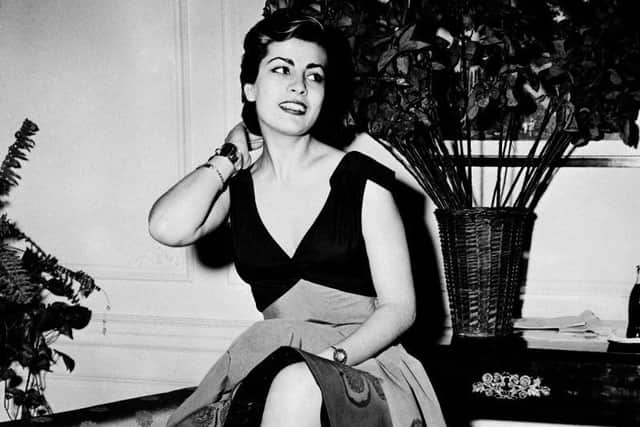Obituaries: Irene Papas, Greek actress best known for The Guns of Navarone
For a generation or so if a western audience saw a Greek film or a Hollywood film set in Greece then the chances are the leading female role would be played by Irene Papas. She was an almost iconic figure of female strength and dignity.
She was unforgettable as the Greek resistance fighter Maria in Second World War epic The Guns of Navarone in 1961, with Gregory Peck, David Niven and Anthony Quinn. She shoots her own friend Anna when it is revealed that Anna had betrayed them under torture.
Advertisement
Hide AdAdvertisement
Hide AdShe was the ill-fated young widow who turns down a local lad in favour of Alan Bates in Zorba the Greek and is beaten and stoned by villagers. The film reunited her with Quinn.


More recently she was the mother figure Drosoula in Captain Corelli’s Mandolin. And in between she played a political activist’s widow in Costa-Gavras’s acclaimed drama Z at the end of the 1960s.
Papas’s own political views had already brought her into conflict with the Greek military junta, which she branded the Fourth Reich. She left Greece to live in Italy and New York, returning in the 1970s when the junta fell.
She won acclaim for her performances in Greek tragedies, on stage and on film. And she brought to modern roles the power of classical Greek theatre.
The highly regarded American critic Roger Ebert once said: “There are a lot of pretty girls in movies, but not many women. Irene Papas is a woman… Ordinary actors have trouble sharing the screen with her.”
She also enjoyed a successful singing career and recorded with Vangelis’s band Aphrodite’s Child.
She married twice and had many relationships, notably a lengthy relationship with Marlon Brando. She said in an interview a few years ago: “I have never since loved a man as I loved Marlon.”
The daughter of two teachers, Papas was born Eirini Lelekou in 1926 in Chiliomodi, Greece, a village near Corinth. She grew up largely in Athens. Her father was a drama teacher. “We were served Sophocles and Euripides for breakfast,” she said. She fell in love with the whole idea of theatre when a touring show visited her village and she staged her own little shows, sometimes acting out roles, sometimes using her dolls as characters.
Advertisement
Hide AdAdvertisement
Hide AdShe went to drama school in Athens at age 15 and played Lady Macbeth and Electra, though she clashed with the school authorities over their very formal approach and she determined early on to do things her way.
She began acting in theatre, and would continue to do so throughout her career, both in Europe and on Broadway. She was in Greek films from the late 1940s and appeared with Anthony Quinn and Sophia Loren in the Italian epic Attila in 1954.
With a growing body of work behind her, she headed for Hollywood, landed a contract with MGM and co-starred with Jimmy Cagney in the 1956 western Tribute to a Bad Man.
But she found herself working largely in television during this American sojourn and it was with The Guns of Navarone and the character of Maria, carrying out a deadly duty that the men shy away from, that she really made her mark internationally.
The film was a big-budget Hollywood production, set in Greece and based on a best-seller by the Scottish author Alistair MacLean. Released in 1961, it was a major box-office hit and remains popular 60 years later.
With that role Papas established herself as Hollywood’s go-to actress when it came to casting Greek or Mediterranean characters, a position that she consolidated a few years later with her appearance as the sensual woman who refuses to bow to local expectations and conventions in Zorba the Greek.
She was Catherine of Aragon to Richard Burton’s Henry VIII and Genevieve Bujold’s Anne Boleyn in Anne of the Thousand Days and was Helen of Troy in a starry film version of Euripides’s play The Trojan Women, with Katharine Hepburn, Vanessa Redgrave and once again Genevieve Bujold.
She was back with Anthony Quinn again in 1976 in The Message, aka Mohammad, Messenger of God, which was financed not by Hollywood, but by Libyan dictator Colonel Gaddafi. The film came under attack from Islamists and film critics, with John Pym of the Monthly Film Bulletin complaining about “unalleviated tedium”.
Advertisement
Hide AdAdvertisement
Hide AdShe and Quinn fared little better a few years later when they linked up with Oliver Reed and Rod Steiger in Lion of the Desert, about Italy fighting a colonial war in Libya.
Her film career rather faded in later years and little that she did attracted the attention of her films from the 1960s and early 1970s. She seemed disillusioned with acting and talked of giving it up. She wrote poetry.
She was married twice, firstly in 1947 to Alkis Papas, a film director and poet. The marriage was short-lived and ended in divorce a few years later, though she retained his name. Her second marriage to Jose Kohn, an actor, was even shorter. They married in Las Vegas, it lasted only two days and was annulled. She had no children.
Obituaries
If you would like to submit an obituary (800-1000 words preferred, with jpeg image), or have a suggestion for a subject, contact [email protected]
Subscribe
Subscribe at www.scotsman.com/subscriptions
